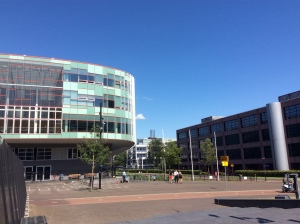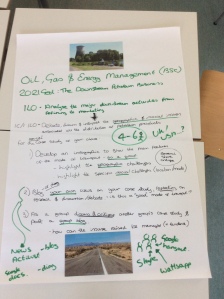I was asked to attend a workshop at the Amsterdam University of Applied Sciences run by Jos Beelen at the European Association for International Education (@TheEAIE)/ Centre for Applied Research on Economics and Management (CAREM). It wasn’t a bad place to spend some time!!

The aim of the two-day workshop was to focus on supporting participants to embed a new Online International Learning (OIL)project in a specific module (or modules) of their choice for delivery in the coming academic year (2015-16). The workshop will achieve these aims through the following activities:
- articulating international and intercultural learning outcomes for OIL projects and the module
- aligning these learning outcomes with (reflective) assessment
- relating these learning outcomes to those of the programme as a whole ensuring a course-based approach, and where possible, to prioritise project integration into courses that do not currently have any
By the end of the work shop we should have had the chance to “internationalise” learning outcomes at a programme and module level, discussed and shared approaches and got feedback from colleagues. The real value in this wasn’t the chalk and talk of the reasons for and approaches to internationalisation. We could have read this from one of Betty Leaks papers on the subject without leaving the UK. What was useful was the facilitators’ personal perspectives on success and failure and the chance to discuss this, test, propose and re-try things with a group of like minded people.
Despite the fact that I’ve now run two OIL projects I feel there are still (many) things that I can learn on the subject. Some of which I’ll learn from my trial and error approach to teaching and others that I’ll learn from discussion with others. A key learning I took was that we need to think about what we want our students to prepare for, why we want our students to participate. This is then the basis of the collaboration (i.e. picking the right partner) and then the tasks that the students are asked to carry out and how they are asked to reflect on it. Rather than deciding that a curriculum or module needs to have an OIL project because a certain number of students need to be “internationalised”. I feel this is most likely to happen when it comes from the bottom up, with top down support, not when it is dictated. The top down support is vital in helping set up the training, the funding and the network and we couldn’t do it so easily without those things.
We had an excellent presentation from Eva Haug who had run an OIL project with a University in Norway. From this I have drawn a few key conclusions:
- Allow freedom in the assignment for students to take their own, more creative approach to reflecting on learning.
- Focus on one topic
- Set clear and high expectations
- Trust that your students will do what they’ve been asked to do
- Focus on coaching, not teaching
- Ensure that students get to know each other first.
Having run my own projects I agree with several of these. My students and those of my partner institution struggled with Skype calls as they all felt very nervous, even several weeks in. We hadn’t allowed them to break the ice before launching them in to the tasks we’d asked them to do. This leads on to one of Eva’s other points about focus. While it could be argued that we were focussed on one topic: human impact on the environment, we asked them to do too many things. As a result the students felt over loaded with work and lost focus and their reflective assignments had a tendency to wander off topic too. So this year we’ve reduced the number of topics or tasks. We’ve also allowed more time for introductions, and changed the platform that we will use to do this. This year we will ask students to post 2 pictures to our Google+ Community one that they think represents their home country’s culture and one that represents their partner country’s culture and explain why (as well as introducing themselves). this then gives us an interesting way to explore cultural stereotypes, rather than just different cultural approaches to environmental management. I’m not sure that we would have done these things without listening to Eva’s talk. Her point about trusting them and setting the expectations early on is really important. There will, I suspect always be some that don’t want to bother, but in my (limited) experience most will do what you ask of them. There is no need to treat them like children. Expectation management is essential, not just in OIL project, but in their performance and engagement overall. They need to know why they are doing or being asked to do something, what benefits it will bring. They shouldn’t have to guess and they shouldn’t think its just because we think that this is what is good for them.
One key area of concern was around assessment and the need to summatively assess everything and the balance between getting students to engage if it isn’t formally assessed. In both my OIL projects the students have had to complete a number of tasks throughout the semester. None of these tasks was formally assessed. At the end of the semester they had to write a reflective essay that covered at least 3 of the 6 tasks. Yet the students did, by and large, still participate in each of the tasks, despite the lack of assessment. They still posted their blogs – albeit with a little bit of reminding and occasionally late.
I am not convinced that everything needs to be formally assessed and graded. If you trust them, if you set and manage their expectations they will do what is asked of them. Or maybe I’m just naïve.
Anyway the workshop gave us time and head space to logically work through from the programme level to a modular level how learning outcomes could be internationalised and what activities could be conducted to facilitate this and then how they could be assessed. This was a really good way to think about it. I developed my OIL projects in the context of the module, with half an eye on the programme as a whole, but in setting up the project for this year I’ve taken a more holistic approach thinking about the modules they will take that semester and the following semester and I’ve built this into their Tutorial sessions so that it is not (hopefully!) done and immediately forgotten about.
I also had a chance to think about some of the other modules that lend themselves to an OIL project (and in the first instance might have a module leader who is willing to give it a go). So I have a plan for a Level 2 OIL project (actually on oil…the energy source). Now all I need is a partner organisation. Thanks to my central team I have a contact, I just need to work on the contact.

Another discussion was around quality, how you integrate it and assess the quality of an internationalised curriculum. I think this is really quite important, but others may see it as red tape and a pain that distracts from getting on with the day job. But having processes, procedures and periodic checks facilitates continual improvement and the sharing of best practice. In my mind this is a good thing….but I’m going to save this exciting topic for another time….